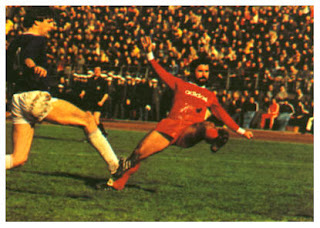Of course, the new champions were full of famous names: Lohr, Flohe, Cullmann, Dieter Muller, Schumacher, the Belgian striker van Gool. Respectable names like Konopka, Zimmermann, Gerber, Strack, Glowacz. A new Danish player called Preben Elkjaer-Larsen... familiar names, but largely from the distance of the time. In real time, the team was rather strange mix of few current national team players – Flohe, Cullmann, and Dieter Muller – one respectable foreign player at his peak – Roger van Gool – and bunch of promising, yet not exceptional players. One relic from the 1960s was still here: Hennes (or Hannes) Lohr, but he was no longer influential key player. It may be right to attribute the victory to Hennes Weisweiler: he managed to motivate and use whatever players he had at hand. The exotic Yasuhiko Okudera was great discovery: the Japanese became a regular. Perhaps the other right decision was trusting Tony Schumacher – only two years ago Schumacher was generally a flop, sharing goalkeeping duties with similarly unstable Slobodan Topalovic. Topalovic was considered more promising of the two... Weisweiler however chose Schumacher and made him firm starter. Topalovic was dismissed in the summer of 1977, which left Schumacher without competition – apparently, it was better for his confidence, for the rise of the great goalkeeper really started in 1977-78. Yet, Weisweiler had few choices – the attack was reduced to two-men line, something rare in the 1970s: Dieter Muller played 33 matches and scored 24 goals. Van Gool played 32 games, scoring 12 times. Lohr, already 35-years old, appeared only 8 times and scored a single goal. Elkjaer-Larsen did not appear even once! The defense, depending of standpoint, was either very reliable or there were no options: Harald Konopka (31/3), Roland Gerber (34/2), Gerhard Strack (32/2), and Herbert Zimmermann (32/2). A mid-table club's line really... competent, hearty, but lacking a pillar like retired Woldgang Weber. Midfield, in a way similar to Bayern, carried the season: Heinz Flohe, the star player and captain now, and Herbert Neumann did not miss a single match – Flohe was replacing Overath and was the playmaker, but although he had strong season and scored 14 goals, he was not very imaginative player. Certainly not a second Overath... Okudera played 20 matches and scored 4 goals – good debut, but more was to be expected from him next season perhaps. Heinz Simmet, hardly a big talent, appeared in 23 games. Another unknown – Dieter Prestin – played 14 matches. Holger Willmer – 11. Jurgen Glowacz, either because of injuries, or bad form, appeared in only 5 games – and he was likelier choice than anonymous Willmer, Prestin, and Simmet. In part, lack of enough quality players led to high rotation. In part, short defense and attack inevitably was compensated by midfielders. To a point the second 1974 World champion in the team – Bernhard Cullmann – was used as an emergency player, plugging holes in other lines. Nominally a defender, Cullmann was used in 'emergency' roles in the national team – he was reliable and versatile enough, if not particularly bright and creative player. Cullmann played 27 games, scoring 6 goals. Not bad for a defender... yet, he was not the key defender of the team. With such limited squad, the best solution was disciplined collective play – and Weisweiler achieved precisely that. Koln was not a team praised for exciting football, nor it was found innovative – to a point, it was over-achieving team. And given its limitations, nobody saw Koln as building a dynasty: it was quite sure that another title was unlikely. But this was evaluation of potential – for the moment, Koln won the title – a fantastic success.
A success, deserving a second look, especially because on the first picture Okudera is missing – here he is with samurai-like mustache. And equally priceless is the pose of Schumacher behind the Bundesliga shield – the much criticized hopeless flop from two years back now a champion.
If there was a player going to be a superstar and giving hope for a strong future, that was Dieter Muller.
He was the top goal-scorer of the league with 24 goals – second year in a row. This time he shared most goals with Gerd Muller.
Both Mullers on top was in a way symbolic: apparently, a successor of the old Gerd was found. With the same name -what could be better? May be great team could be shaped around Dieter and Koln would actually become constant, not accidental, force? It was not to be, unfortunately... Dieter Muller climbed quickly to the top and equally quickly faded.




